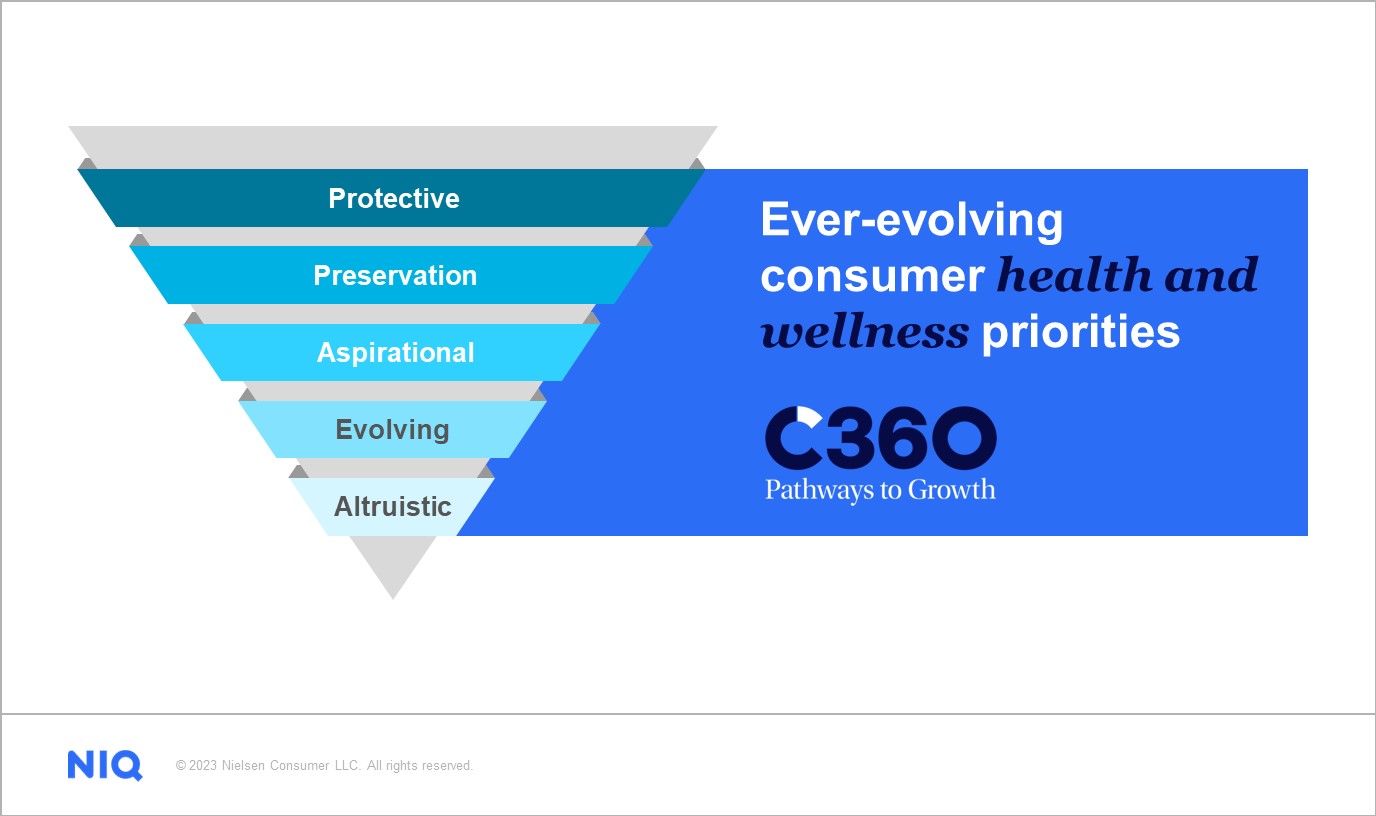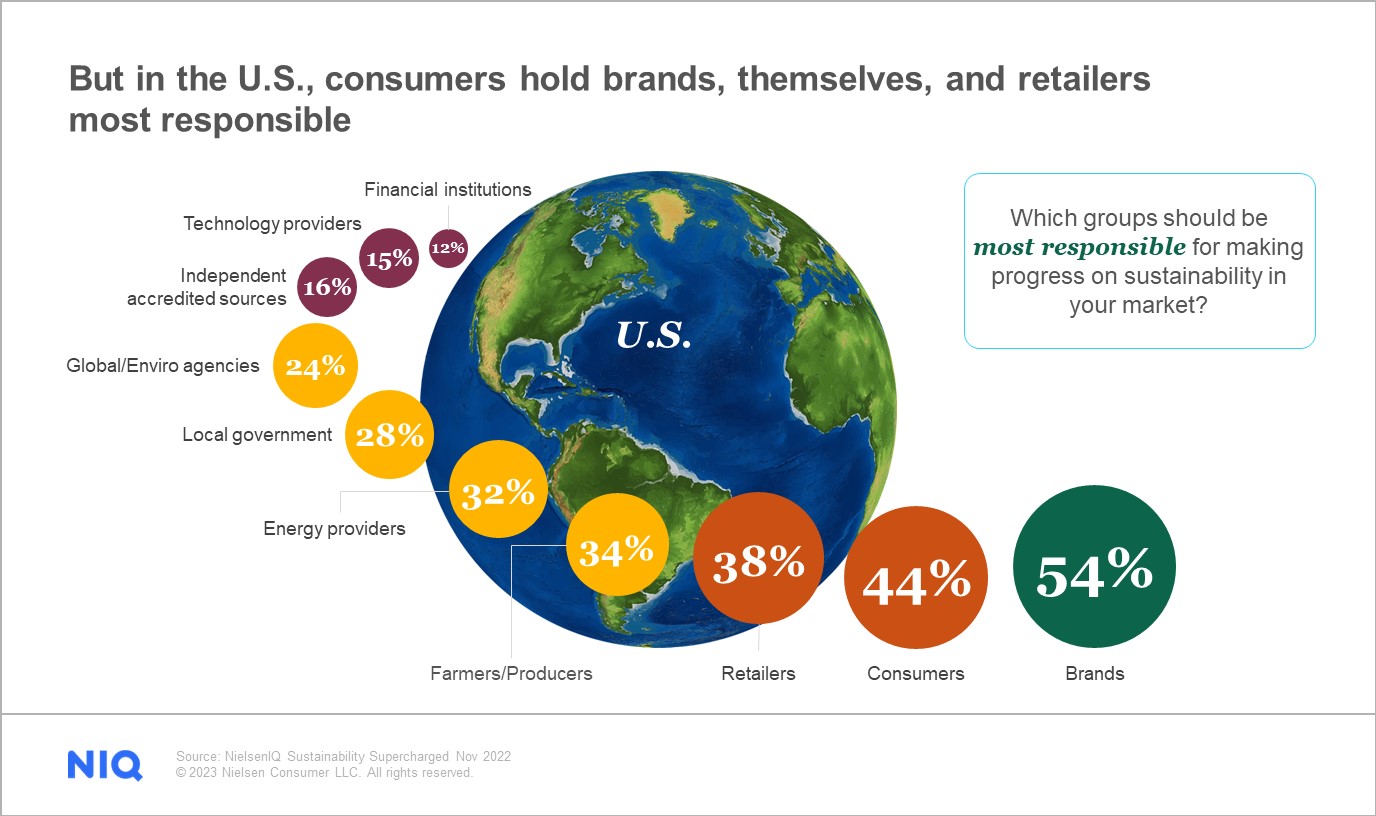Businesses evolve, meeting consumer’s altruistic motives
Doing well by doing good has long been a mantra for conscious capitalists. More businesses are evolving to match their consumers’ altruistic motives in the health and wellness sector.
“As companies evolve, a notable shift towards purpose-led initiatives is taking place,” said Sherry Frey, VP of Total Wellness at NIQ. “This signifies a commitment to making a positive impact on society.”
Speaking at NIQ’s C360, she cited research that identified altruistic wellness — consumers caring about the health of the planet as well as each other — as a focal part of the consumer hierarchy of wellness. In recent research, “We were intrigued to see altruism had moved up in importance in the hierarchy of wellness. We believe this is one of the biggest opportunities for your businesses.”

Frey shared her remarks in her introduction of the “Owning the Change” themed topic presentations at C360. The series of presentations showcased several organizations identified as trailblazers for their efforts at taking ownership of meaningful change in what is often referred to as ESG — for environmental, social, and governance initiatives.
ESG impact on spending and loyalty
NIQ published significant research on this topic earlier this year in a report produced with McKinsey, “Consumers care about sustainability — and back it up with their wallets.” Frey was a principal investigator on the project. Among key findings from that report:
- Spending. Consumers are shifting spending toward products with ESG-related claims — a “clear and material link.”
- Growth. Products making ESG-related claims averaged 28% cumulative growth over the past 5-year period versus 20% for products that made no such claims.
- Loyalty. Brands with more sales from products making environmental, social, and governance-related claims also enjoy greater loyalty.
“It’s important to recognize this aspect of loyalty,” noted Frey. “It’s not just about our consumers, who indicated a higher level of consumer loyalty to brands that have claims. It’s about employees, and it’s about ourselves.” She cited a recent survey where 76% of employees indicated they want to work for a company that is trying to make a positive impact on the world.
This attitude is pervasive among consumers too, and it represents what NIQ identifies as “one of the biggest opportunities for your businesses,” she said. “There is an increasing consumer demand and, in the analysis we’ve done on younger consumers, we anticipate this demand will accelerate.”
Who is most responsible
“Consumers are looking to the CPG industry to support their altruistic journey,” Frey said.
“When we asked consumers globally who are the most responsible for sustainability, brands and government topped the list,” she said. “But in the U.S., consumers hold brands themselves and retailers most responsible.”
She shared NIQ data that indicated that 54% of consumers felt the responsibility for ESG progress lies with brands, compared with 38% who cited retailers and 28% local governments.

“Governments and mandates will play a role as well,” Frey said, “whether it be greenhouse gas emissions reporting or labeling of healthy food or banning of specific ingredients.”
The trend is driven further by the reality of the economic costs, which affect consumers personally. “They also worry about environmental impacts, supply chain disruptions, increasing energy costs, and the economic cost of an unhealthy America,” she said.
“Our space is one where daily, consumers can show who they are, what their values are, by their purchases. They are seeking more than products; they are looking for brands that align with their values and contribute to a better world.”
Three NIQ initiatives
NIQ is an active participant in the altruistic wellness movement. “We are using data for good,” said Frey, citing 3 current initiatives:
- Investment in a long-term collaboration with Feeding America to map the meal gap to inform decisions that will help ensure equitable access to nutritious food.
- Partnership with ReFED, which has a very ambitious goal to drive a 50% reduction in food waste in our industry by 2030.
- Collaboration with the Consumer Goods Forum — Coalition for Healthier Lives, to help our industry understand how we can all collaborate to improve the health of the most vulnerable consumers globally.
A conscious path forward
“Why do we believe this will drive growth?” Frey said the research conducted with McKinsey found that it wasn’t just small and challenger brands that were driving outsize growth by emphasizing ESG. It was also large established brands and private labels. “The only segment we didn’t see outsize growth was actually in the medium segment, which we think indicates some opportunity.”
She added, “By prioritizing this, you can build stronger connections with consumers, drive innovation, and foster sustainable growth.”
Frey told the audience, “Some of you have said, ‘We will own this; we will lead.’ Some of you have admitted you’re ‘checking the box’ for requirements and trying to figure it out.”
“At NIQ, we have the Full View™ of conscious business,” she added. “We want you to know we are right here with you, wherever you are on your journey. We’re making the investments to serve you in this space — from innovation to analytics to product attribution to consumer insights. We are here to help you succeed authentically and with commitment.”
Have questions or would like to learn more? Reach out, and we’d be happy to connect with you.



